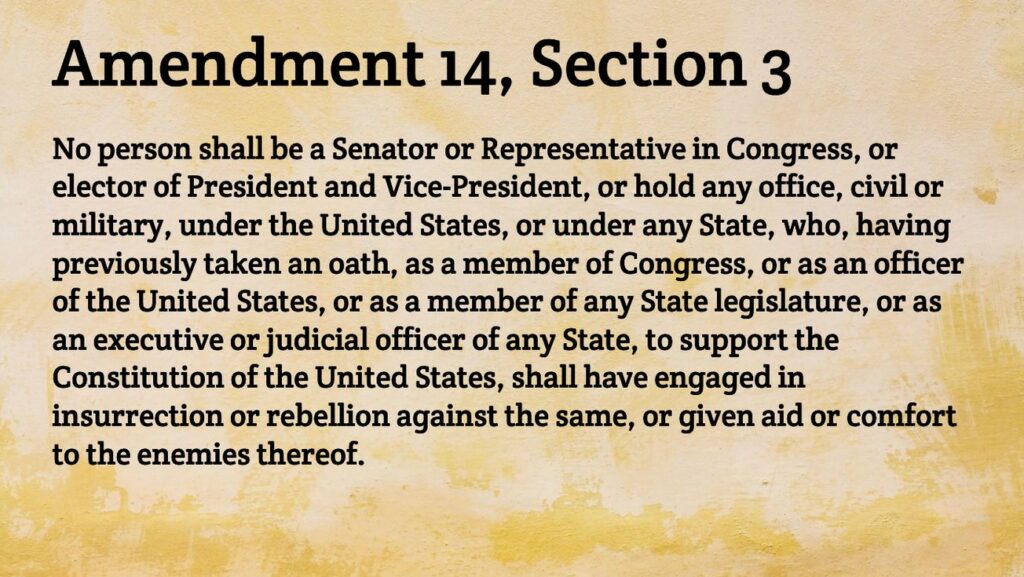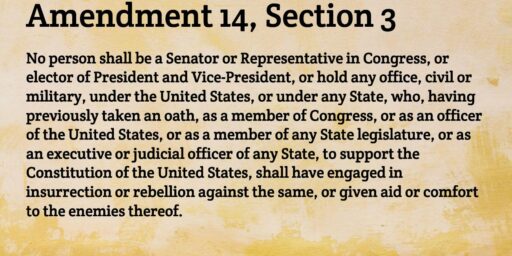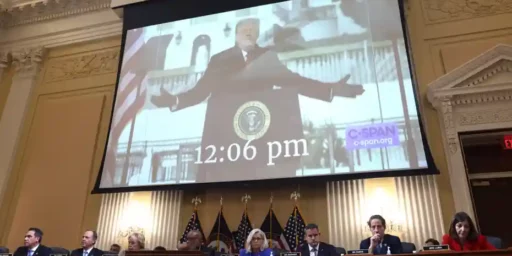Another Judge Rejects 14th Amendment Solution
It's going to be up to the American people to keep Trump out of the White House.

CNN (“Trump to remain on Michigan ballot after judge rejects another 14th Amendment challenge“):
A Michigan judge on Tuesday dismissed a lawsuit that tried to use the 14th Amendment’s “insurrectionist ban” to remove Donald Trump from the state’s 2024 ballot.
The judge separately ruled that Michigan’s secretary of state doesn’t have the power under state law to determine the former president’s eligibility for office based on the 14th Amendment, which says anyone who took an oath to uphold the US Constitution is banned from office if they “engaged in insurrection.”
The rulings mark a major victory for Trump, who recent polls show has a commanding lead in the 2024 Republican presidential primary race, as he fends off lawsuits in key states that argue he fueled the January 6, 2021, attack on the US Capitol and is therefore disqualified.
Last week, the Minnesota Supreme Court rejected a related constitutional challenge against Trump in that state. A similar anti-Trump challenge is pending in Colorado, where a ruling is expected by the end of this week. Regardless of the initial rulings in these closely watched cases, most experts anticipate appeals that go all the way to the US Supreme Court, which could settle the issue for the entire nation.
Indeed, the liberal advocacy group involved in the Michigan case said Tuesday that it was filing an “immediate appeal” and would also ask the state Supreme Court to step in and hear the case.
The 14th Amendment, ratified after the Civil War, says US officials who take an oath to uphold the Constitution are banned from future office if they “engaged in insurrection.” But the Constitution doesn’t say how to enforce the ban, and it has only been applied twice since 1919, which is why many experts view these challenges as a long shot.
These lawsuits have been filed by left-leaning advocacy groups, but a bipartisan array of legal scholars and former jurists have endorsed their attempts to disqualify Trump from office. Some of the cases have been filed by well-funded advocacy groups, and others were brought by little-known candidates or concerned citizens – but none of them have succeed yet in removing Trump from any ballot.
This outcome and reasoning has struck me as obvious from the moment the “14th Amendment solution” was first raised. While I think Trump rather clearly engaged in fomenting an insurrection—and has even been indicted on related Federal criminal charges—he has yet to be convicted. It would be absurd, indeed, it a state election official or judge could simply willy-nilly ban him from the ballot.
I also agree with this:
Michigan Court of Claims Judge James Redford said in his decision Tuesday that questions about Trump’s role in the January 6, 2021, insurrection – and whether it constitutionally bars him from returning to the White House – should be addressed by elected representatives in Congress.
He ruled that the matter was a “political question” that shouldn’t be decided by the judicial branch. The judge also said he didn’t have the authority under state law to force election officials to examine Trump’s eligibility based on the 14th Amendment.
A court disqualifying Trump would’ve taken that decision away from “a body made up of elected representatives of the people of every state in the nation, and gives it to but one single judicial officer, a person who no matter how well intentioned, evenhanded, fair and learned, cannot in any manner or form possibly embody the represented qualities of every citizen of the nation,” Redford wrote.
It seems reasonable to me that, pursuant to the findings of the January 6 Committee, Congress could declare Trump ineligible under the 14th Amendment. But that would require bipartisan consensus, which rather obviously does not exist.
UPDATE: Regular commenter @Sleeping Dog reminds me in the comments that the House impeached Trump for his part in the Capitol Riots but the Senate failed to convict. Not that I’d forgotten this, of course, but had Congress done its part through the impeachment route the 14th would be irrelevant: they could simply have disqualified him.
UPDATE II: Some of the discussion below reminds me that I should highlight longer treatments of this issue from previous posts. (Those reading on a laptop or similar device will see them in the Related Posts sidebar but this doesn’t show on mobile devices and the like.)
- “If it Was an Insurrection, Why Hasn’t Anyone Been Charged with ‘Insurrection’?” January 6, 2022- A fairly deep dive into a related issue
- “The Disqualification Clause and January 6,” January 20, 2022 – An early rejection of the idea, responding to an article by the late Blake Hounshel.
- “Banning Trump From Office,” December 23, 2022 – A response to a recommendation of the January 6 Committee to bar Trump on 14th Amendment grounds
- “14th Amendment Solutions,” August 20, 2023 – A detailed rebuttal of an op-ed and law review article






Especially since the bicameral position of the GQP is that an usurper currently illegally occupies the White House, eh?
I agree with you and the judges’ rulings, but am not looking forward to having to rely on the ‘wisdom’ of my fellow Americans in the election.
The last, best opportunity to keep trump off the ballot using the 14th, was the second impeachment. When he’s convicted of the 1/6 charges in either the Federal case or the GA case, it certainly will be revisited, but I don’t believe that will change anything. Trump maybe ineligible under the 14th, but beyond impeachment there is no process to make that judgement. And I don’t blame state courts for not wanting to go down that path.
@Flat Earth Luddite:
FWIW, I think this statement gets to the challenge of discussing the issues within our political ecosystem that is being teased out in the Political Dysfunction comments.
“Having to rely on the ‘wisdom’ of my fellow Americans in the election” focuses us on voter agency. However, as we all know, because of the Electoral College system, we’re really not just talking about the ‘wisdom’ of all voters. If that were the case, then we would rely on a popular vote and–based on the presumptive Republican Candidate’s electoral history–things wouldn’t feel so dire at this point.
Instead, due to the structure of our system, our presidential elections come down to a handful of “swing states” that slowly morph over time due to a mix of factors (including internal state policies–because states run elections in the US, not the federal government–and geographic sorting/growth/migration patterns).
So, in actuality, we’re not relying on the ‘wisdom’ of all voters–we’re relying on the ‘wisdom’ of a subset of voters in a few key states. It’s a mix of structure and agency.
But that’s hard to communicate, so we tend to over-index on the agency part (not to mention accept the structure part as a sort of immutable rules of the game).
Absent a conviction at either impeachment or criminal trial, barring via the 14th amendment would boil down to a judge’s opinion about someone’s culpibility, with no clear criteria for judgement or even meaningful guidance. That would be too harmful a precedent to set.
@Matt Bernius: Not to be pedantic, but it’s not the EC as such, but rather the winner-take-all approach to handing out EC votes. But just to head off comments, I think the best thing would be to eliminate the EC and replace it with national popular vote with Federal elections handled by the Federal government.
@Matt Bernius:
@MarkedMan:
In a previous millennium, our daughter was failing school…badly. Largely because she wouldn’t acknowledge or play by the system’s rules. This continued until “Uncle” Cracker convinced her that you have to know and acknowledge the rules of the game to subvert them successfully.
When I was trying to go for (in a short and flippant manner) that in my opinion, with the current splintering of the body politic, I’m not looking forward to the next presidential election.
Obviously, I wandered deep into the weeds on this one.
Sadly, the various cases made a serious error. In my opinion, no one has standing. Yet.
Why: The GOP has yet to declare Trump their candidate. As such, he would only be on a ballot for the primary. A primary is not “holding” an office.
Once the GOP has officially made a selection THEN you have the situation where a party is putting forth an insurrectionist (likely convicted by election date). THEN you have a clear-cut 14th issue.
Right now, there is still the very very slim chance that Trump will not be the GOP candidate. as such, he may (or may not) be on the ballot.
—————————————-
Point of interest: I found this article very good in stating that states DO (and have had) the right to remove people from the ballot, specifically listing times that this has been done.
Routine Disqualification: Every State Has Kept Ineligible Candidates off the Ballot
It’s what I expected, for the reasons cited by the judge.
Not surprising.
I would only note that Trump is undeniably guilty of
He has repeatedly promised pardons to people found guilty of sedition.
All the same, not surprising.
I don’t have a problem with the ruling per se, given the above points that a) he’s not even the nominee yet, and b) he hasn’t been convicted of anything yet. BUT, I don’t particularly agree with this logic:
“A court disqualifying Trump would’ve taken that decision away from “a body made up of elected representatives of the people of every state in the nation, and gives it to but one single judicial officer””
Let’s say the issue was in question whether Trump was 35 years old or not, certainly a single judicial officer could decide eligibility in that case.
@Flat Earth Luddite:
Although, oddly, these folks rejected Trump by a margin of 3 million and 8 million votes in successive elections. It’s just that our bizarre election procedure for Presidents turned those into a win and a nail-biter.
EDITED TO ADD: I see @Matt Bernius beat me to the observation. @MarkedMan is right that this is compounded by the winner-take-all approach used by 48 of the 50 states + DC. But the Electoral College alone greatly amplifies the power of the smaller states, since everyone starts with two Electors—which would presumably go 100% to the statewide winner even if we allocated the rest on a District-by-District basis. (And that would compound the Gerrymanding of the House districts.)
I think this is wrong.
Our federalist system pushes the running of elections onto the states, so Secretaries of State are routinely deciding ballot access issues, and being sued over it. They are generally of the “does this candidate live in the district?” and “did they collect enough signatures on the right forms?” questions, but this is just one more. Since the 14th Amendment doesn’t specify who makes the determination, I think it just goes down the normal path.
With the 14th Amendment not being clear on the subject, I think we need to look at what standard of evidence applies.
Criminal conviction requires a “beyond a reasonable doubt” standard, which is appropriate if we are talking about incarcerating someone.
If the greatest peril someone can have is that they cannot hold office, it seems more like a “preponderance of evidence” standard is appropriate, which is used for civil proceedings.
Plus, every other question of ballot access is treated with a “preponderance of evidence” standard.
I’m sure treating it like any other ballot question would have some terrible consequences — there are a lot of dumb ass states out there — but without the 14th saying otherwise, I think it’s the “right” answer.
@Franklin: @Gustopher: I discussed this at much greater length back in August.
@Gustopher: By that logic, every Republican Secretary of State could simply declare Biden committed insurrection by stealing the 2020 election from Trump. It would be absurd to require him to then fight that in court.
@Flat Earth Luddite:
“Democracy is the theory that the common people know what they want, and deserve to get it good and hard.”
@James Joyner:
That sounds like a great reason (among many others) to expand the House.
@MarkedMan:
Totally agree. And this also emphasizes how structures… well… structure possibilities. Proportional allocation would be a good compromise.
And to the structuring structures point, that’s a decision that is left up to the States versus the Federal Government. Which gets to how hard our system is to change.
@mattbernius:
#sorrynotsorry, but I have to again point out the practicalities – to make the proportional allocation model work, you’d basically need almost every state to simultaneously agree and pass legislation (or change their constitutions, which in most states requires a referendum) to allocate their EC’s proportionally. Suffice it to say, that is unlikely in the extreme.
I’ll get on my soapbox again to expand the House. It would still be very difficult politically, but it’s functionally simple legislation and results in a much more accurate spread of EC votes across the states.
@Andy: Great! Now all we need is 2/3ds of both the House and Senate to agree to do it (maybe 4/5ths in certain conditions, I’m not clear on that part) or 2/3rds of the states to petition for an amendment to the Constitution calling for the change.
Lemme know when you’re ready so I can register to vote–this is one proposal where you’re gonna need everybody you can get on board. (Unlike electing a President where you only need 50% +1 of the people in 4 or 5 swing states.)
@Sleeping Dog:
The mills of the law grind slowly but they grind exceedingly slowly. Seems unlikely anything’s going to reach a verdict, much less exhaust appeals. before the election. Fani Willis in GA is talking 2025. If he’s elected he’ll kill the Federal charges either by pardoning himself or ordering his AG to drop them. We could have the spectacle of a sitting president under trial in GA.
@James Joyner: I didn’t say it wasn’t an absurd and unpleasant outcome. It would also be like having each state decide whether Obama was a secret Kenyan.
It is, however, how our election system runs in enough other, more mundane scenarios that there’s a strong precedent for it.
Moreover, as the Mandalorian would put it: “This is NOT the way.”
Scratching Trump from some state ballots would result in the MAGAs claiming this was a rigged election…forever…and the odds of violence go up greatly. They need, at minimum, a final definitive loss before they will begin to be willing to dub him a loser.
We’re back to the situation before the first of the four (so far) criminal indictments against the Cheeto: Who dares execute the king?
I’d like to say if one state dares, others will follow. But, as gVOR10 put it, the legal wheels grind very slowly. Other states might follow, if the decision of the first holds up on the many appeals. And that will take place too late to affect anything, if one state dares to begin with.
@Just nutha ignint cracker:
The beauty of expanding the House is that it only requires simple legislation – a simple majority in the House, 60 votes in the Senate (assuming the filibuster), and a Presidential signature. The only thing the states have to do is redraw districts.
@Andy:
You’re making me say a phrase I loathe: What about the human element*?
I do favor expanding the House. In fact, I wouldn’t mind a law mandating a representative per 250,000 people, though likely 500,000 would be more feasible.
But, 1) the GQP knows this would hurt them electorally and would never vote for it, and 2) the House won’t be eager to dilute the meager power each representative holds.
1) can be fixed by electing 60 Democrats to the Senate, 61 if Sinema retains her seat. 2) could be achieved by a concerted campaign over at least many months, more likely years and a couple of congressional iterations, since the dilution wouldn’t be much (at a rep per 500k population).
The second might happen. The first is highly unlikely.
*I hate saying that. I imagine a “Hu” symbol on the periodic table with ridiculous atomic number and mass and orbitals.
@MarkedMan:
As opposed to allowing a known traitor (vernacular sense, not legal) to be elected President and Commander in Chief? I’m not really disagreeing so much as lamenting the sorry state we find the Republic in. There doesn’t seem to be any non-terrible option.
@Kathy:
I thought that was hubrium, first isolated in ancient Greece but named by the Romans…
@Kathy:
Yeah, it won’t just happen on its own and would require a lot of political work to convince the House to dilute its membership, which would likely take a lot of time and effort – years, if not decades. However, it still would be significantly easier than amending the Constitution.
@Andy:
It seems to me that “only” and “simple” are doing a lot of heavy lifting in this example. I don’t see this legislation happening in my lifetime–but I officially have emphysema and cirrhosis, so that will work to your advantage in that my lifetime is probably foreshortened. Truthfully, I don’t see it happening in anyone’s lifetime–and that’s not particularly advantageous at all. Still, I wish you the best of luck. We probably needed to be doing things that only require simple legislation 25 or 30 years ago when we had a legislature that could do simple things. If only we’d known then what we know now. 🙁
Step back and look at the can of worms Trump has opened by being an openly and proudly corrupt former, and would be future, president: never before has the question of whether a president can pardon himself come to the forefront; never before has the 14th amendment’s insurrection clause needed interpretation viz a viz a presidential candidate; never before has a former president taken and refused to return classified documents; never before has the country witnessed the dereliction of duty that occurred on January 6th. The list goes on, and the country is put on unsteady ground because the founders didn’t envision a scoundrel like Trump getting past the gatekeepers. Trump uses “unprecedented” as a shield, hoping no one will notice WHY prosecuting the things he has done is unprecedented: no other former president has been THAT corrupt. And given his post 2020 election behavior it is silly to think that any kind of electoral defeat….by a landslide or a single vote…will prevent him from howling the election was rigged.
The Left forgot the Part, where in order to be an Insurrectionist, it would have been necessary to first find Trump guilty in Court of Insurrection !
@Just nutha ignint cracker:
You are correct that simple doesn’t mean easy. And I’m not ignorant of the difficulty, especially considering how little visibility this gets, much less actual support.
My point is mainly that this option is simple and much easier than rewriting or amending the Constitution. And this could be a useful goal to reach on the way to building the political support to necessary for that much more difficult and heavy lift.
@Andy:
100%–expanding the House cap and filibuster reform (or elimination) are on the top of most reformists’ advocacy lists for exactly this reason.
And you are right that neither party is particularly interested in enacting either due to the dilution of power (in the case of filibuster reform, concern about it being used against them).
The challenge is that each party stands to gain and lose from both in the short term. Increasing House membership will most likely help the Democrats (in the short term). Elimination (or significant reform) of the Filibuster will most likely help Republicans who have a structural advantage in the Senate (provided the defacto head of their party doesn’t keep kneecapping them).
Both would definitely make our Federal Government more democratic and should be embraced. And these are things most Americans should want to advocate for.
It’s “An Overwhelming Mandate Due To The Wisdom Of The Electorate” when a Republican wins a state race by 11 votes. It’s a stolen election if a Democrat wins by any margin.
Except for the 2000 presidential race which was actually stolen by Republicans. Whatever you think you’re accomplishing in polite company, bringing up the Brooks Brothers Riot just isn’t done, good sir!